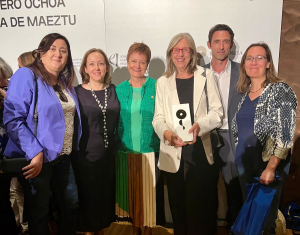The Institute of Corpuscular Physics (IFIC), a joint center of the University of Valencia and the CSIC, received accreditation as a Severo Ochoa Center of Excellence last week during a ceremony presided over by the Minister of Science, Innovation, and Universities, Diana Morant. Representatives from all centers and units accredited in this excellence program between 2018 and the present attended the event. Also present were the Director of the State Research Agency, Domènec Espriu, the President of the CSIC, Eloísa del Pino, the Rector of the University of Valencia, María Vicenta Mestre, and the President of the Scientific Committee of the “la Caixa” Foundation, Javier Solana.
The Severo Ochoa Centers of Excellence and María de Maeztu Units of Excellence program aims to enhance the quality of Spanish scientific research by recognizing research organizations that stand out for the relevance and impact of their activities. This recognition is awarded through a competitive call for applications, which are evaluated by an international scientific committee. The evaluation criteria include the global impact of the research, the generation of cutting-edge knowledge, the ability to train and attract international human resources, collaboration with other high-level research centers, and knowledge transfer and dissemination activities to society. The recognized centers and units span a wide range of scientific disciplines, from mathematics, physics, chemistry, and engineering to the humanities and social sciences, including life sciences and medicine.
IFIC has received the Severo Ochoa distinction for the second time, following an initial phase during 2015-2019. This time, the project has been awarded for four years, with a total funding of approximately 5.5 million euros, while the accreditation is valid for six years, until March 2030. In addition to the social and scientific recognition, this accreditation grants priority access to other initiatives aimed at promoting research.
At the event, held at the CaixaForum in Madrid, Minister Morant highlighted the “profound transformative capacity” of these excellence institutions to contribute, through science, to addressing the challenges Spain faces as a country. “You are proof that science, well-being, and democracy are three indisputable and inseparable pillars that we must care for and strengthen,” she said.
About IFIC
The Institute of Corpuscular Physics (IFIC, CSIC-UV) is a pioneer in Spain in research in particle physics, nuclear physics, and astroparticle physics, as well as in their applications in medical physics and other fields of science and technology. IFIC has a long history of participation in international scientific projects, alongside institutions such as CERN and Fermilab, and its researchers are at the forefront of scientific knowledge in fundamental physics.
Thanks to this distinction, IFIC aims to bring fundamental research closer to society, promoting a deeper integration of science into the social and economic fabric. To achieve this, a strategy has been designed based on innovative initiatives in areas such as quantum technologies, medical physics, and advanced instrumentation, which are essential for advancing scientific knowledge and have great potential to generate applications with direct impact on everyday life in fields such as health, energy, and communications. An essential component of this program is strengthening technology transfer, including partnerships with companies and other innovation centers, to facilitate the practical application of these research efforts.
Additionally, the Severo Ochoa project at IFIC is strongly committed to training new generations of researchers, providing them with the tools necessary to face emerging technological challenges, such as those arising from advances in artificial intelligence. “This strategic plan, in addition to strengthening and diversifying our research, is designed to anticipate and respond to future challenges. Science is constantly evolving, and with this approach, we want to ensure that IFIC remains at the forefront in developing new technologies and creating solutions that benefit society as a whole,” said Verónica Sanz, principal investigator of the Severo Ochoa project at IFIC

